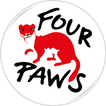
Bird Flu in U.S. Dairy Cows
FOUR PAWS urges WHO member states to tackle the root causes of zoonotic diseases in pandemic agreement
BOSTON, MA – APRIL 10, 2010 – For the first time, dairy cattle in six U.S. states were infected with highly pathogenic avian influenza (HPAI) H5N1 raising serious public health concerns. It is also a first time where the virus was transmitted from cow to human, as the U.S. Center for Disease Control and Prevention (CDC) confirmed this week that a person in contact with dairy cows had tested positive for the virus. Alarmed by these latest developments, FOUR PAWS, global animal welfare organization, calls for a fortification of international efforts on pandemic prevention by tackling the drivers of outbreaks: the intensification of farming, wildlife farming. and the loss of habitat for wild animals.
The excessive number of animals in factory farms, kept in crammed, stressful and unhygienic conditions, is a major contributor to the transmission, circulation, and mutation of avian influenza viruses. Transitioning to smaller farms with higher animal welfare and phasing out high-risk practices can lower disease risks, limit culling and animal suffering, and reduce economic losses. For example, 485,000 mink, foxes and raccoon dogs were mass killed in Finland in 2023, and 141 million poultry died or were euthanized worldwide in 2022 due to H5N1.
FOUR PAWS believes that we must reset of our relationship with animals. International institutions and national governments need to tackle the root causes of zoonotic disease emergence in a holistic approach that recognizes animal welfare as one major aspect in the prevention of pandemics and must take action to improve animal welfare.
The One Welfare Framework (now included within the new One Health definition) could serve as a guiding framework towards treating our planet and all its inhabitants with more respect, care, and compassion – for their sake and ours. The political response to prevent future pandemics must focus on making our farming and agricultural systems more resilient and banning practices that increase the risk of zoonotic disease emergence and spread, like the commercial wildlife trade, the dog and cat meat trade, and fur farming.
FOUR PAWS has been leading the way on identifying ways forward, including by publishing a Future Study on Pandemic Prevention report, which produced stark and worrying results. The study featured international experts from disciplines such as virology, human and veterinary medicine, and climate research who have highlighted a worrying picture for the future, showing that zoonoses are a clear symptom of the serious crisis between humans, animals and the environment as well as the extent to which animal suffering contributes to disease outbreaks, with dramatic consequences on health, society, and the economy has been highly underestimated.
The Pandemic Treaty is an international instrument for pandemic prevention, preparedness, and response. It is currently under negotiation and will be finalized in May 2024 at the World Health Assembly of the WHO. About 75% of emerging infectious diseases are zoonoses, i.e. transmissible between animals and humans.
FOUR PAWS is the global animal welfare organization for animals under direct human influence, which reveals suffering, rescues animals in need, and protects them. Founded in 1988 in Vienna by Heli Dungler and friends, the organization advocates for a world where humans treat animals with respect, empathy, and understanding. FOUR PAWS’ sustainable campaigns and projects focus on companion animals including stray dogs and cats, farm animals and wild animals – such as bears, big cats, and orangutans – kept in inappropriate conditions as well as in disaster and conflict zones. With offices in Australia, Austria, Belgium, Bulgaria, France, Germany, Kosovo, the Netherlands, Switzerland, South Africa, Thailand, Ukraine, the UK, the USA and Vietnam, as well as sanctuaries for rescued animals in eleven countries, FOUR PAWS provides rapid help and long-term solutions. www.fourpawsusa.org
